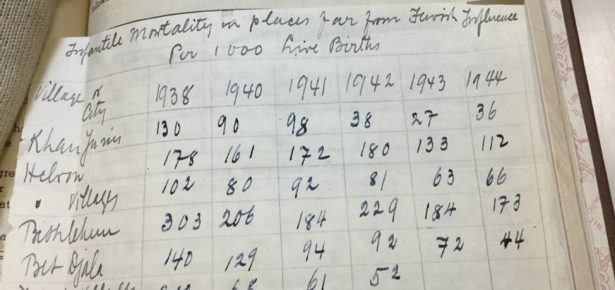
As I was conceptualizing a project on death in early 2016, a friend and colleague I was visiting in Jerusalem mentioned a sloppy online essay that had drawn the ire of Palestinian feminists. The piece essentially argued that Palestinian women had difficulty receiving an abortion in the West Bank because of “culture.” Thinking about abortion in Palestine triggered many conceptual, theoretical and practical questions in my mind that I address in Buried in the Red Dirt: Race, Reproduction and Death in Modern Palestine. What did and does seeking an abortion mean to Palestinian women in a context of settler-colonial and imperialist dispossession based on demographic and political erasure and land theft? How could I study the phenomenon historically in Modern Palestine?
From many conversations with historians, physicians, and public health workers such as midwives and nurses I learned that abortion was largely undocumented in British colonial Mandate Palestine (1918-1948), a non-archival subject, because it was illegal and stigmatized. Zionist health institutions and Zionist elites in Mandate Palestine also condemned abortion. Nevertheless, the birth control practice was ubiquitous among Palestinian and non-Palestinian women.
I developed three additional lines of inquiry that emerged from archival and oral history research.
First, most Palestinians during the Mandate period died before they were three years old, which forced me to reckon with causes. I found that Palestinians died disproportionately young because of poverty, hunger, and limited medical care linked to British policies of extraction, with Jews offering a comparison group because of the vast investment of the Zionist movement into Jewish health and vitality in Mandate Palestine. British colonial authorities certainly imposed the most brutal direct violence they could get away with on Palestinian subjects when they rebelled. But in their day-to-day lives, Palestinians suffered most from poverty, illness, and high levels of infant and child mortality. Thus I foreground the racialized distribution of health, life, and death.
Second, I take seriously anti-reproductive Palestinian desires and practices before and after 1948, challenging Zionist projections onto Palestinians of their own longstanding support for competitive Jewish reproduction in Palestine as part of a demographic project. I critically engage with broader demographic scholarship that either takes for granted a Palestinian commitment to reproductive futurity or sloppily projects onto Palestinians actually existing Zionist commitments to Jewish reproduction and Jewish bodies on the land of Palestine.
Third and related, I use queer and pessoptimist readings to consider death and intergenerational struggle in the Palestinian futurisms articulated after 1948. I propose that demographic competition with Jews has been largely irrelevant to Palestinian reproductive desires and practices since 1948, a year during which they viscerally and universally recognized the importance to Zionism of the double action of “Judaizing” and “De-Arabizing” the land. Representing Palestinians as hyperbolically reproductive misses the range of socio-economic, psychic, and contextual factors that have shaped Palestinian reproductive and anti-reproductive desires and practices and distorts our ability to see the emphasis on creative, political, and social struggle and regeneration in the face of social and political death in the futurities articulated after 1948.
I track these and other matters in Buried in the Red Dirt: Race, Reproduction and Death in Modern Palestine using state archival sources, newspaper accounts, oral histories, and Palestinian literary, film and artistic production. I avoid cataclysmic historical points and instead call attention to ordinary colonial subjects such as Palestinian nurse-midwife Alice Butros, who unsuccessfully battled with British Department of Health officials as they refused to provide healthcare for an extremely ill indigent child at the Jerusalem Government Hospital.
Latest Comments
Have your say!